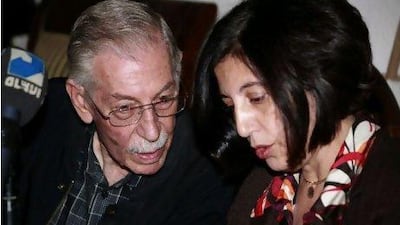DAMASCUS // Opposition activists gathered on the outskirts of Damascus yesterday as their efforts to unite and organise in the struggle against the Syrian regime gained momentum.
The meeting, involving members of the National Board of Coordination, one of two major opposition coalitions, came as the United Nations announced the death toll after almost seven months of protests had risen to more than 2,900.
Citing "reliable sources", Rupert Coville, spokesman for the UN high commissioner for human rights, warned that the real figure could be significantly higher because thousands of people have gone missing since the revolt started in March.
"According to the detailed list of names of individuals we've been keeping, the total number of people killed since protests began in Syria now stands at more than 2,900," Mr Colville told journalists in Geneva. He said an unknown number of the dead were likely to be security personnel.
By comparison, the civilian death toll in Iraq since the beginning of March is 2,135, according to Iraq Body Count, an organisation tracking violence in the insurgency there.
Syrian officials insist the actual number killed is closer to 1,400 and claim half of them are members of security services while the other half are civilian victims of the foreign-backed Islamic extremists the regime says it is fighting.
Human rights groups and dissidents said another 12 people had been killed yesterday in clashes between defecting soldiers and loyalist army units in the Jabal Al Zawiya area, near the Turkish border.
Seven of the dead were soldiers, the other five either civilians or deserters, activists said. Loyalist troops and defectors fought an extended battle in the city of Rastan before the army eventually retook it from the rebels.
There have been persistent reports of defecting soldiers seeking refuge, and carrying out attacks against government forces, in Jabal Al Zawiya.
While opposition figures insist the uprising remains overwhelmingly peaceful, many dissidents now acknowledge that anti-regime groups are increasingly taking up arms, particularly in Homs and Idleb.
One group of defectors calling itself the Free Syrian Army claims to have thousands of soldiers on its side, and has been calling for armed resistance as the only way to topple the regime of President Bashar Al Assad.
Opposition figures advocating a continuation of a peaceful uprising met yesterday at a farmhouse in Dreesh, 15km north of Damascus. It was the second time the coalition of dissidents, known variously as the National Coordination Committees or National Board of Coordination (NBC), has openly gathered on Syrian soil.
Since their last meeting in mid-September when 300 dissidents, including street protesters, met at the same venue, a dozen NBC members have been arrested, according to officials with the group.
Yesterday's gathering of some 84 activists, once again including those involved in regular street demonstrations and prominent dissidents such as the economist Aref Dalila, began with chaotic scenes as some NBC members insisted that the state-run Syrian television be excluded from recording inside the meeting hall.
The state news film crews initially refused to leave, insisting that anyone advocating democracy should not impinge media access, an argument that gained some support from a minority of NBC members.
Grassroots activists said they would not allow themselves to be recorded by the regime-affiliated reporters because they feared the footage would end up in the hands of the secret police. Other journalists were allowed to stay to report on proceedings.
"Allowing your face on state TV is like turning yourself into the security services. No one would do it," said one activist.
The NBC is one of two main opposition groups to have coalesced into more-or-less coherent organisations since March. The other, the Syrian National Council (SNC), has held its meetings outside Syria although it has members based inside the country and has won the backing of the Muslim Brotherhood and local coordination committees.
Disunity among Syria's opposition is a major hurdle to overcome if the uprising is to maintain momentum.
The formation of the SNC and NBC, which have brought old-guard dissidents together with the young generation of protesters, suggests an increased unity. NBC members have expressed reservations about the more confrontational SNC, fearing that it might become a vehicle to justify foreign military intervention in Syria. The NBC has unequivocally rejected all violence and foreign interference.
But NBC officials have disclosed close links to the SNC, and expect cooperation between the two. Both groups contain key members of the Damascus Declaration, a pro-democracy coalition that briefly rose to prominence in 2005 before being suppressed by the regime, and both have street protesters among their ranks.
"It's logical that we will coordinate with the SNC," said one leading NBC member, on condition of anonymity. "We are ready to do that. There is a complicated road ahead for the uprising and we must all be ready to work hard and innovate if we are to find the formula for success."
The NBC was due last night to elect an executive board of 30 members, which would then select a leader.

